By Arnaldo Canciani
Part three
Memorie.al / This first part of my memoirs, which covers a period of twenty years; 1928 – 1949, I dedicate it to all those who have lived and suffered like me in Albania, the inhuman deprivations and sacrifices of my parents, and my entire family. I extend my dedication, to many Africans forced to emigrate in search of better living conditions, to all the soldiers who were forced to fight in a foreign country for transient ideals and, many of them, have not seen their families again and are buried in a foreign country, to all those who are oppressed by dictatorial regimes and those unjustly sentenced to death, to the prisoners, to those who have suffered unimaginable torture.
PREFACE
Continued from the previous issue
1941 – Return to Gemona, after 12 years
After the end of the Greek campaign, the area was relatively quiet again at the beginning of July and my mother and sister returned to Albania and the family was reunited again. In the eleven years we had spent in this country, I had always dreamed, hoped, and wished to return to Italy, to meet my people, my relatives, and my hometown, Gemona.
This dream finally came true in September 1941. The enthusiasm was great, but I was also a little worried. This was the first visit that I had to face alone, an understandable fear, given that I had not yet turned 18. At the waiting station in Gemona, my uncle Joseph, my mother’s brother, had come out for me; I was a guest at their house, in Paludo, for the entire period of my stay in Italy. It was harvest time!
One morning, with baskets and containers loaded on a small donkey, we set off for the fields; in addition to family members, some friends came to help my uncle, in these cases, farmers exchange courtesies.
This was an opportunity for me to meet and enter into friendly relationships with some girls: I was not a champion of beauty, but I realized that I had a certain attraction to them; so I managed to get rid of my shyness and I changed, transforming into a “butterfly,” to seek rest in the “flowers” with nectar.
The period of my stay in Friuli came to an end, happy, unforgettable days, passed intensely joyful and happy; enjoying the fruits that life offered me, consciously, without knowing what the future would hold for me. The thought of returning to Albania disturbed my mind, but unfortunately, no one knows if fate is a right, and we do not often have the opportunity to choose.
Sad return to Albania
One of the first days of October with great sadness in my heart, I started the journey to Albania. The train journey lasted 26 hours; from Bari to Brindisi, the last two wagons were detached, but I still arrived on time to get on the ship. In a harmony with my state: “The sea, with the same rhythm, sent a sigh, almost like a groan, into the deep night. Goodbye, Mona Lisa ghosts of, an hour, dreams of love, scattered by the wind, dearest hopes, that fall on the waves.”
I arrived home, hugged my parents and told them: “I want to return to Italy.” But fate was insensitive. I resumed my work at AIPA and my usual life, with great nostalgia in my heart and mind, with the indelible memories of Gemona. The year 1941 was at an end, the roar of the cannons was no longer heard, but the war, always bloody, continued somewhere else.
At the beginning of January 1942, I received a regular summons to perform military service. I had to report in person, in the district of Berat. My father accompanied me to the carrier station. When I greeted him, for the first time I saw tears flowing from his eyes. He was a simple and rough man, he was able to control his feelings, but in this case, he could not hide his emotions. The distance to go to the recruitment center was only 15 km.
After arriving, we were immediately given the necessary equipment for food rations, towels, clothes, weapons, etc. Instead of socks we were given napkins, with which some practice is required to wear them on the feet. We slept in 50-meter-long hangars, in two rows of sailor beds on both sides, the central corridor with two doors at the ends. At that time, Albanian military units were created, they would have to fight against the partisans, but the officers who commanded the night patrols always called the Italian army, for their unquestionable reliability.
My period lasted only one month. Being a qualified worker, already militarized, at the request of the company where I worked, I was given temporary leave. My parents received the fact that I returned home with great joy. To be released from military service in time of war was a great fortune; I was now allowed to resume normal family life.
Unfortunately, I had no alternative that would allow me to interrupt the daily rhythm, even hiding was not possible. There were no railways, no other means, that would enable us to reach cities such as; Vlora, Durrës and Tirana, even though the distance did not exceed 100 km.
This is how I lived the year 1942 and the others to follow, a prisoner in a village of several thousand people, hoping and waiting for a better tomorrow. The situation on the various fronts had worsened.
September 8, 1943
Mussolini was overthrown by the Great Council, and it arrived at the darkest hour, on the night of September 8, 1943, Italy signed an armistice with the allies, he heard the clatter of machine guns, the shots of joy, the soldiers hoped that the war was long, after years of the band, waiting to return to their families, but they did not know what bad fate awaited them. General Badoglio, with an ambiguous proclamation, had left them in danger. No more orders arrived; the officers did not know what decisions to make.
There were about sixty thousand Italians in Albania, much more in number than the German troops. Unfortunately, after a short period of security and taking advantage of the confusion of our army, the Germans disarmed all the Italian soldiers. Most of them refused to cooperate and were imprisoned by them. About a thousand, they reached the Albanian partisans and fought with them, gathered in the “Antonio Gramshi” brigade.
The officers of some departments who had rebelled were killed. In a few days, all of Albania was placed under the control of the units of the German departments. Our oil-bearing field had become their only source of fuel supply: Many of our prisoners were forced to dig large tunnels under the hills, to install new refineries, protected from bombing.
The waste from refining, which could not be used locally, was discharged into a large, deep pit, dug in the field in front of my house. A new company was created, (the Albanian Oil Company, under the direction of the Austrians).
Groups of specialized soldiers had the task of controlling the various departments of the oil-bearing construction site. All the workers were militarized before the armistice by the Germans and were grouped into a department called the “Fifth Company”. They built hangars and dormitories for sleeping and every morning, they took us to different workplaces; in the evening, the soldiers had the duty to accompany and control. We ate at home, but the fact that I had to spend nights in hangars that were far from my home, about four kilometers, made me uncomfortable.
After not a long time, the opportunity arose to solve this problem: four volunteers were required who, after completing a short training, in addition to normal work, would also be firefighters. I agreed, knowing that the choice was not without risks. There were two rooms in a villa near my house, in one room I slept, Enriko Division, Bruno Lucchini and Gambino, a Venetian.
In the next room, there was a German soldier of Polish origin, a firefighter by profession; throughout the long period of cohabitation with this soldier, the relations were not very friendly. Judging objectively, I must say that, despite the rigid and cold discipline, he behaved like a father in the family, never practiced the threat of punishment and revenge, in a way, that we perhaps deserved his arrogance and wickedness.
Only once were we called during the night, to put out a fire in the refinery, caused by a fuel transport. We quickly opened the tube-clothes (sleeves), made the connections, opened the gates, but there was not a drop of water: and we could not do anything, but a spectacle of actions.
The Allied bombing
Pipo “the bomber,” with his reconnaissance plane, came to visit us almost every night. The noise of the squadrons of bombers in transit was often heard, the German 88 mm anti-aircraft batteries went into action often. Now the day of the baptism of fire has come for us too. On November 12, 1943, dozens of British bombers, in successive groups, released hundreds of shots.
I and my master Dariol, due to the noise of the machines in the workshop, we did not hear the alarm signal; and we ran without reaching the shelter and lay on the ground. When the explosions stopped, smoke was seen in the direction of Dariol’s house; a shell part had killed his wife, a girl, and wounded his mother. This incursion, which was the first, caused several deaths and many injuries.
In mid-December, the first group of Italian families received permission to return to Italy, for the New Year 1944; they were greeted by the German army, with bursts of machine gun fire and other colored weapons. We looked from the sky hoping to catch the fireworks of peace. In the first days of March, a second group of Italian families managed to get permission to return to Italy.
Meanwhile, larger air attacks continued near the airport; the anti-aircraft artillery was always forced to act; even during the night, against the partisans, who were hitting from the surrounding hills. Some letters, which from time to time came from Italy, gave courage and helped to keep this small flame lit, what is called hope.
NO!
The Germans, on March 12, 1944, ordered all the Italians, who were grouped in the fifth company, to take part in a meeting. It was a cloudy day, the wind seemed to be turning into a storm, we walked quickly through the long road lined with poplars. No one spoke! Everyone was thinking about the sad conditions that the war had caused. When we arrived at the square where the meeting took place, we found our friends, lined up in the square, waiting for the captain.
Sixty German soldiers lined up with combat equipment, had occupied a quadrant, a quarter of the square. On our faces was visible anxiety and unconcealed concern. Thousands of thoughts unfolded in our minds, hearts worked accelerated, and blood flowed to the brain, with an ever higher rhythm: a darkness and weakness, took over all of us.
If a foreigner had frowned for a moment, he would have fixed in our eyes full of anger and hatred, between these two feelings he would have clearly read an iron desire, a single unanimous, an unshakable decision not to swear allegiance to the foreigner, who considered us as slaves for work, for 10 ALL a day and a single meal of bread, trampling on the most sacred human rights, throwing hundreds of human beings into an impenetrable moral and physical shock.
After a few minutes of waiting, a large car appeared with the captain: a short and connected man, about fifty years old, with vulgar characteristics and expressions. With a slow, rhythmic step, walking in the center of the square, where a small table covered by the flag with the broken cross was placed. After the command “at ease” given by the company commander, the captain began reading the formula of the oath of loyalty to the Germans, at the end of this, our lips moved just enough to let a monosyllabic, dry and stormy word pass:
No! Like a multiplied echo and scattered by the gray morning wind. By order of the captain, the German soldiers unloaded their weapons, which with a ridiculous and arrogant certainty; he had loaded to greet the new volunteers. The sacred rights and feelings of man, trampled for so long, as there has been and will always be their revenge, even at the cost of great sacrifices.
Later, the Germans tried to convince us individually, to adhere to their request, but out of 250 people, only four accepted and were lucky, they were repatriated three years before us. There was no revenge against those who did not join.
The bomber incursions continue
From April to June 1944, a significant increase in air activity was noted. The four-engine Allied bombers passed constantly, probably going to Romania. On July 23, the terror from the sky came to us too; dozens of Allied planes released hundreds of one-ton bombs. I and Kamoni, were working to fix a compressor at the ice factory; we took shelter in a large space of an iron flywheel.
The closest bomb fell less than a hundred meters and destroyed a bridge that connected the two banks of the river. The body of the Italian who had taken shelter under the bridge was discovered by a shepherd, after a few days. Another bomb fell in the pit where the unrefined oil waste (soil pits) was discharged, which caught fire. A pile of stones and soil weighing several quintals rose and fell on my house and destroyed the roof. To avoid theft, my father and I were forced to sleep in these conditions for several nights.
In the morning we looked like Africans, covered in the black smoke caused by the fire of the oil waste in the soil pit. With a workbench in hand, my father and I collected the most important things to save them and put them back in the right place. My mother and sister every morning went three or four kilometers away to the village and spent the day in the shade of a tree.
The crow that my sister, Albina, had taught always followed them flying. The air strike had not caused serious damage to the neuralgic points of the construction site, the power plant, the refinery, and the fuel depots, they had been saved by a few meters, large holes, scattered in a width of one kilometer, and a length of about three km.
From the air reconnaissance, it was perhaps noted that they had not designated as primary objectives! Three days later, on July 26, 1944, they reappeared in the sky, to finish the job. I went to a dark shelter, built in the shape of a horseshoe, with a long bench to sit on, while the bombs fell a short distance away; from the stretching of the hands, I realized that everyone had taken shelter under the chairs.
A German soldier at the entrance of the shelter had a pale face and was all made of black bitumen. In the face of danger, I have always managed to maintain calm to face the fear for the days to come. Memorie.al




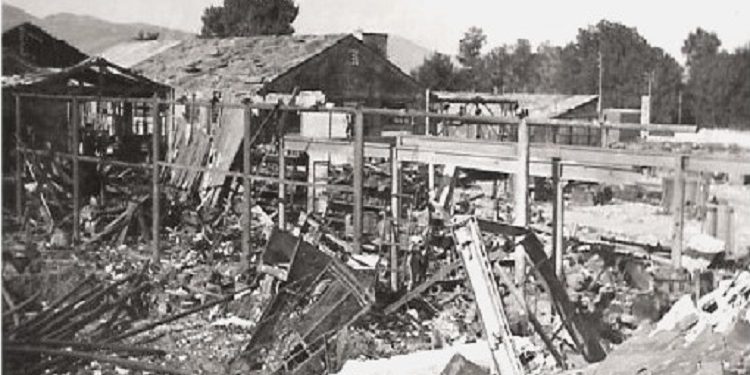
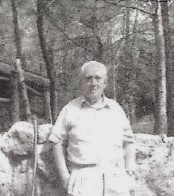
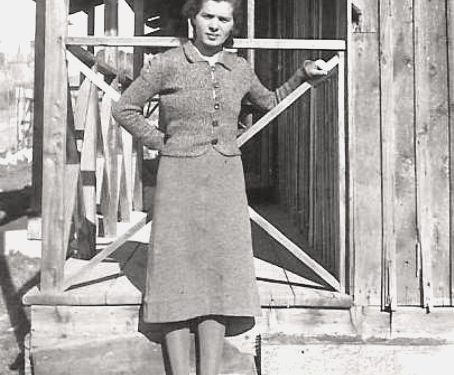
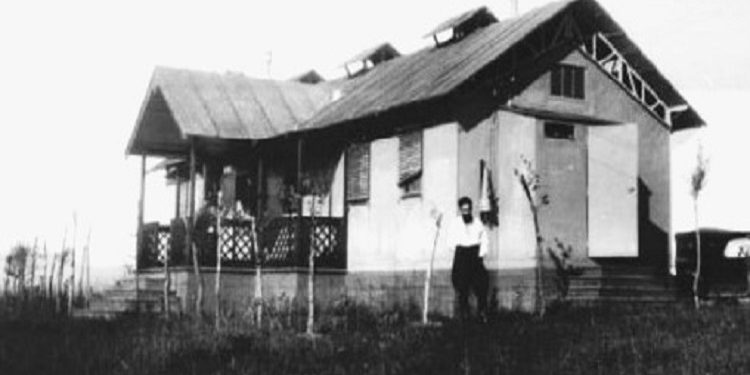
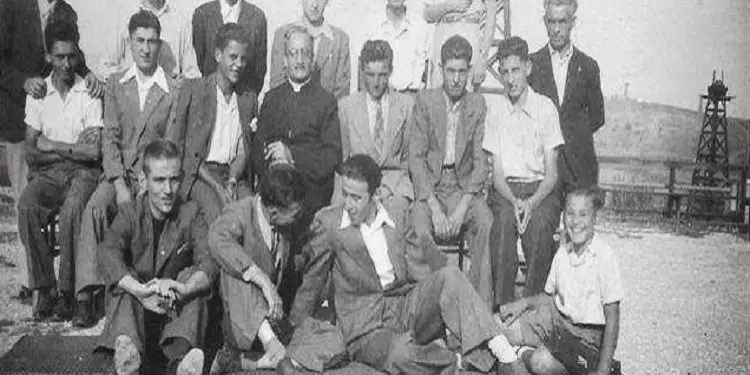
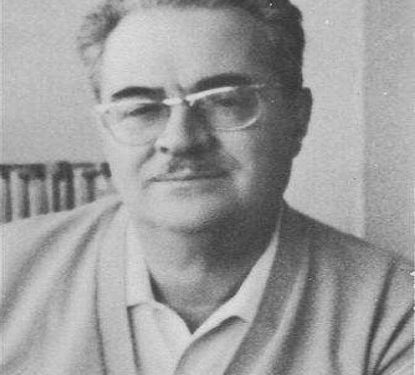
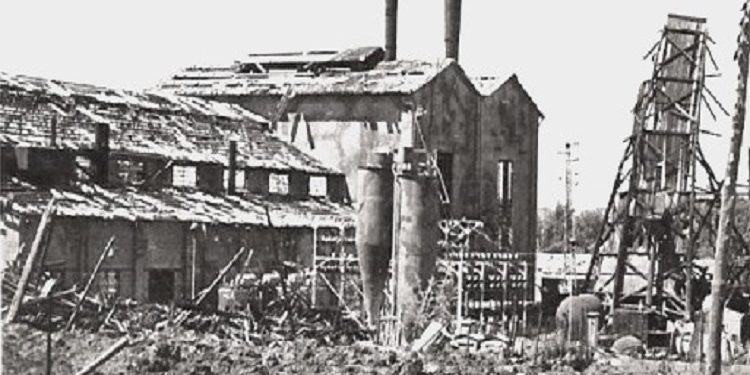
![“When the party secretary told me: ‘Why are you going to the city? Your comrades are harvesting wheat in the [voluntary] action, where the Party and Comrade Enver call them, while you wander about; they are fighting in Vietnam,’ I…”/ Reflections of the writer from Vlora.](https://memorie.al/wp-content/uploads/2025/06/admin-ajax-4-350x250.jpg)


![“The ensemble, led by saxophonist M. Murthi, violinist M. Tare, [with] S. Reka on accordion and piano, [and] saxophonist S. Selmani, were…”/ The unknown history of the “Dajti” orchestra during the communist regime.](https://memorie.al/wp-content/uploads/2026/02/admin-ajax-3-350x250.jpg)
![“In an attempt to rescue one another, 10 workers were poisoned, but besides the brigadier, [another] 6 also died…”/ The secret document of June 11, 1979, is revealed, regarding the deaths of 6 employees at the Metallurgy Plant.](https://memorie.al/wp-content/uploads/2026/02/maxresdefault-350x250.jpg)

